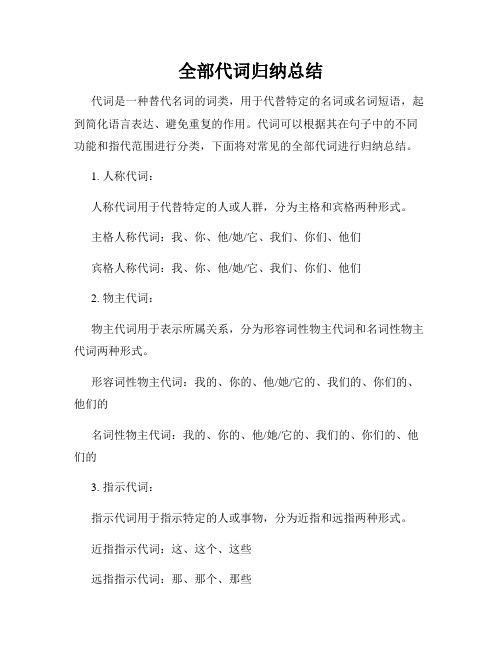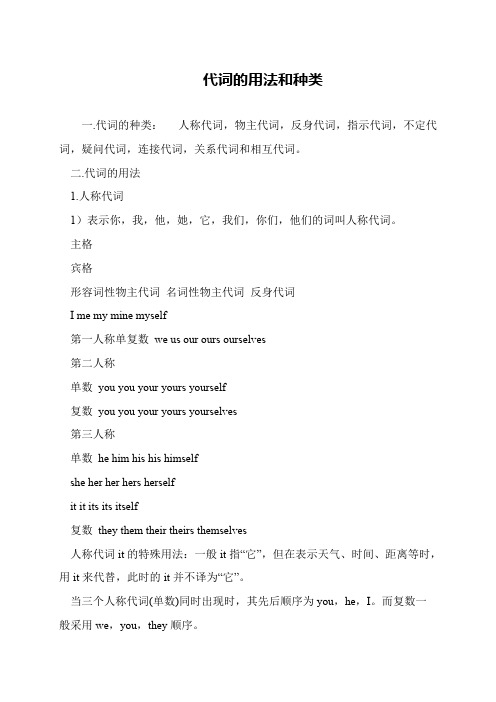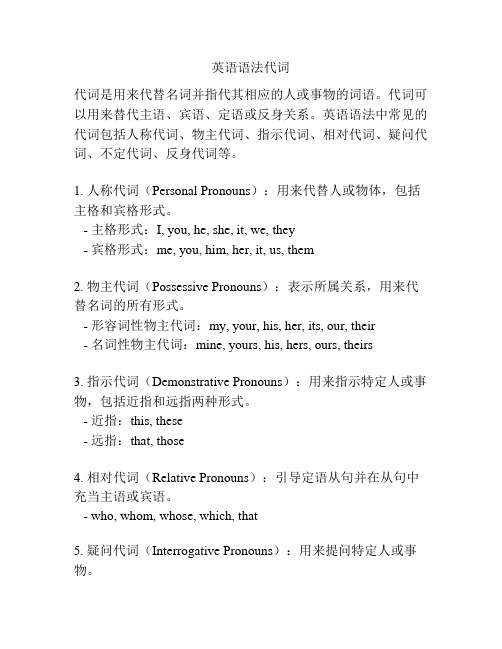代词
全部代词归纳总结

全部代词归纳总结
代词是一种替代名词的词类,用于代替特定的名词或名词短语,起到简化语言表达、避免重复的作用。
代词可以根据其在句子中的不同功能和指代范围进行分类,下面将对常见的全部代词进行归纳总结。
1. 人称代词:
人称代词用于代替特定的人或人群,分为主格和宾格两种形式。
主格人称代词:我、你、他/她/它、我们、你们、他们
宾格人称代词:我、你、他/她/它、我们、你们、他们
2. 物主代词:
物主代词用于表示所属关系,分为形容词性物主代词和名词性物主代词两种形式。
形容词性物主代词:我的、你的、他/她/它的、我们的、你们的、他们的
名词性物主代词:我的、你的、他/她/它的、我们的、你们的、他们的
3. 指示代词:
指示代词用于指示特定的人或事物,分为近指和远指两种形式。
近指指示代词:这、这个、这些
远指指示代词:那、那个、那些
4. 疑问代词:
疑问代词用于提问特定的人或事物,分为主格和宾格两种形式。
主格疑问代词:谁、什么、哪个、哪些
宾格疑问代词:谁、什么、哪个、哪些
5. 不定代词:
不定代词用于泛指一类人或事物,没有具体指向。
常见的不定代词有:所有、一切、各种、任何、凡是、其他、另一些、无数等。
6. 相互代词:
相互代词用于表示相互关系的人或事物。
常见的相互代词有:彼此、互相。
以上是常见的全部代词的归纳总结,但并不是穷尽所有的代词形式。
代词在使用中需要根据具体语境进行选择,以确保表达的准确性和一
致性。
熟练地掌握代词的使用可以使语言表达更加简洁、流畅。
常见英语代词

常见英语代词
代词是英语语法中的重要部分,它可以替换名词,以避免使用重复的词语。
在日常英语中,代词经常被使用,因此了解常用的代词及其用法非常重要。
下面是一些常见的英语代词:
1. I - 我
2. you - 你
3. he - 他
4. she - 她
5. it - 它
6. we - 我们
7. they - 他们/她们/它们
8. me - 我(宾格)
9. him - 他(宾格)
10. her - 她(宾格)
11. us - 我们(宾格)
12. them - 他们/她们/它们(宾格)
13. this - 这个/这个
14. that - 那个/那个
15. these - 这些
16. those - 那些
17. any - 任何
18. some - 一些
19. all - 所有
20. each - 每个
21. every - 每个
22. both - 两者都
23. either - 任一
24. neither - 也不
25. none - 没有
以上是一些常见的英语代词,它们在日常英语中经常被使用。
熟练掌握这些代词及其用法,可以帮助你更好地表达自己。
代词的用法和种类

指示代词的特殊用法: (1)为了避免重复,可用 that,those 代替前面提到过的名词,但是 this,these 不可以。 (2)this,that 有时可代替句子或句子中的一部分。 5. 不定代词 主要不定代词的用法: (1)one 的用法 A. one 作为代词可以指人,也可以指物。 B. one,ones (one 的复数形式) 可用来代替前面出现过的少数名词,以避免 重复。 C. one 的前面可用 this,that,the,which 等词来修饰。 D. 常有 a+形容词+one 这一形式。 it 和 one 的用法区别:it 用来指特定的东西,而 one 则用于替代不特定的东 西。 (2)some 和 any 的用法区别 A. some,any 可与单、复数可数名词和不可数名词连用。some 一般用于肯 定句,any 一般用于否定句,疑问句和条件句中。 B. some,any 与—thing,—body,—one 构成的合成词的用法与 some,any 一样。 C.在疑问句中,一般不用 some,只有当问句表示一种邀请或者请求,或期 待一个肯定的回答时才能用 some。 D. some 在否定句中表示半否定,any 表示全否定。 E.some 用于单数可数名词前,表示“某个”而不是“一些”。 (3)other,another 的用法 数
种类 单数 复数 泛指 another=an other other (boys) others 特指 the other the other (boys) the others 功能 作主语、宾语、定语 作定语 作主语、宾语 A. another=another 另一个”,泛指众多者中的另一个,在原有基础上自然 增加的另一个。一般后面接单数名词,前面不能加定冠词。有时 another 可以 用在复数名词前表示“又”“再”,如: I want to have another two cakes.我想再吃两个蛋糕。 B.the other 表示两个中的另一个,常与 one 连用。常见形式是“one...the other...”。 C. other+复数名词=others D. the other+复数名词=the others (4) a11、both 的用法 both 表示“两者都……”,而 a11 表示“三个或三个以上的人或物都……”。
英语代词五种代词

英语代词五种代词
英语的代词可以分为五大类:人称代词、物主代词、指示代词、反身代词和相互代词。
以下是关于这五种代词的简要介绍:
1、人称代词:是用来代替人或事物的词,如I(我)、you(你)、he(他)、she(她)、it(它)、we(我们)和they(他们)等。
人称代词有单数和复数之分,还有主格和宾格之分。
2、物主代词:表示所有关系的代词,用来表示人或事物的所属关系。
物主代词分为形容词性物主代词和名词性物主代词两种。
形容词性物主代词如my(我的)、your(你的)、his(他的)、her(她的)、its(它的)、our(我们的)和their(他们的)等;名词性物主代词如mine(我的)、yours(你的)、his(他的)、hers(她的)、its(它的)、ours(我们的)和theirs(他们的)等。
3、指示代词:用来指示或标识人或事物的代词,如this(这个)、that(那个)、these(这些)和those(那些)等。
4、反身代词:表示反射或强调自身关系的代词,如myself(我自己)、yourself(你自己)、himself(他自己)、herself(她自己)、itself (它自己)、ourselves(我们自己)和themselves(他们自己)等。
5、相互代词:表示相互关系的代词,主要有each other(彼此)和one another(互相)等。
这五种代词在英语中都有着广泛的应用,掌握它们的用法对于学好英语非常重要。
英语语法代词

英语语法代词代词是用来代替名词并指代其相应的人或事物的词语。
代词可以用来替代主语、宾语、定语或反身关系。
英语语法中常见的代词包括人称代词、物主代词、指示代词、相对代词、疑问代词、不定代词、反身代词等。
1. 人称代词(Personal Pronouns):用来代替人或物体,包括主格和宾格形式。
- 主格形式:I, you, he, she, it, we, they- 宾格形式:me, you, him, her, it, us, them2. 物主代词(Possessive Pronouns):表示所属关系,用来代替名词的所有形式。
- 形容词性物主代词:my, your, his, her, its, our, their- 名词性物主代词:mine, yours, his, hers, ours, theirs3. 指示代词(Demonstrative Pronouns):用来指示特定人或事物,包括近指和远指两种形式。
- 近指:this, these- 远指:that, those4. 相对代词(Relative Pronouns):引导定语从句并在从句中充当主语或宾语。
- who, whom, whose, which, that5. 疑问代词(Interrogative Pronouns):用来提问特定人或事物。
- who, whom, whose, which, what6. 不定代词(Indefinite Pronouns):指代不确定人或物体的代词。
- some, any, no, all, each, every, few, many, several, someone, anyone, no one, everyone, etc.7. 反身代词(Reflexive Pronouns):表示动作的反身关系。
- myself, yourself, himself, herself, itself, ourselves, yourselves, themselves以上是英语语法中常见的代词,它们在句子中扮演着重要的角色,可以使句子更加简洁明了。
古代汉语--代词

巫马期以告,子曰:“丘也幸,苟有过,人必知之。”
(论语·述而)
臣之壮也,犹不如人,今老矣,无能为也矣。
(左传·僖公三十年)
仆非敢如是也。
(司马迁《报任安书》)
妾以无烛故,常先至扫室布席。(战国策·秦策)
《战国策》:甘茂亡秦出关,遇苏代曰:“江上之贫女, 与富人女会绩而无烛,处女相与语,欲去之。女曰,妾以 无烛故,常先至扫室布席,何爱余明之照四壁者?幸以赐 妾。”以是知三代之时,民风和厚勤朴如此,非独女子也, 男子亦然。
古代汉语 通论
代词
1
目录
□ 代词的分类 □ 指示代词 □ 人称代词 □ 疑问代词 □ 无定代词 □ 辅助性代词
2
一、代词的分类
古代汉语代词可分如下五类:
1、指示代词:⑴此、之、是、斯、兹、 然、尔、若 ⑵其、彼、夫 ⑶焉、诸
2、人称代词: ⑴我、吾、予(余)、朕、卬 ⑵女(汝)、尔、若、乃、而 ⑶其、之、彼、厥
客胡为若此?
(战国策·齐策四)
曷为久居此围城之中而不去?(史记·鲁仲连邹阳列传)
许子奚为不自织?
(孟子·许行)
“许子冠乎?”曰:“冠。”曰:“奚冠?”曰:“冠素。”
(孟子·滕文公上)
颜回见仲尼,请行。曰:“奚之?”曰:“将之齐”。
(庄子·人间世)
37
3、指处所的疑问代词:
主要有“安、恶、焉”,相当于现代汉语的“哪里”主要作状语, 也可作宾语。例如:
26
昭王南征而不复,寡人是问。(左传·僖公四年)
愚谓大计不如迎之。
(三国志·吴书·周瑜传)
走虽不敏,庶斯达矣。
(张衡《东京赋》)
庶:将近,差不多。斯:这。 这句话是说:我虽然不敏于大道,但这样就差不多了。
代词
代词有代替、指示作用。它跟所代替、所指示的语言单位的语法功能大致相当,就是说,所代的词语能做什么句子成分,代词就能做什么成分。如果按句法功能划分,代词可以分为代名词、代谓词、代副词。传统语法按作用划分成三大类:代替人或事物的叫人称代词,表示疑问的叫疑问代词,指称或区别人、事物、情况的叫指示代词。使用代词有使语言简洁、经济的作用。
指代副词
多
3.指示代词
指称或区别人、事物、情况的叫指示代词。
近指
远指
指代一般名词
这
那
指代处所名词
这儿、这里
指代数量名词
指代谓词(动词、形容词)
这样、这么样
那样、那么样
指代副词
这么
那么
(又,"每、各、某、本、另、该、别的、其他、其余"等也都是指示代词。)
折叠分类
1.人称代词
代替人或事物的叫人称代词。
第一人称
个体:我
群体:我们、咱们
第二人称
个体:你、您
群体:你们
第三人称
个体:他、她、它
群体:他(她、它)们
2.疑问代词
表示疑问的叫疑问代词
指代一般名词
谁、什么、哪
指代处所名词
哪儿、哪里
指代时间名词
多会儿
指代数量名词
几、多少
指代谓词(动词、形容词)
怎样、怎么、怎么样
代词的种类和用法
代词的种类和用法代词是指用以代替名词或名词性短语的词语。
它们在句子中起到代替名词的作用,使得句子更加简洁明了。
代词的种类较多,下面将对常见的代词种类和它们的用法进行详细介绍。
1. 人称代词人称代词用于代替人或事物,并具有指示特征。
主要分为第一人称、第二人称和第三人称。
第一人称代词用于指代说话人自己,包括:I,we,me,us等。
例如:- I am a student.(我是一名学生。
)- We are going to the park.(我们要去公园。
)第二人称代词用于指代对话中的对方或受话人,包括:you等。
例如:- Are you coming to the party?(你来参加派对吗?)- Can you help me with this?(你能帮我一下吗?)第三人称代词用于指代与说话人和受话人无关的人或事物,并根据其性别和数的不同进行变化。
例如:he,she,it,they等。
例如:- He is my brother.(他是我的兄弟。
)- She is a doctor.(她是一名医生。
)- It is raining outside.(外面正在下雨。
)- They are my friends.(他们是我的朋友们。
)2. 指示代词指示代词用于指示特定的人或物。
包括:this,that,these,those等。
单数指示代词包括:this(这个)和 that(那个)。
例如:- This is my house.(这是我的房子。
)- That book is mine.(那本书是我的。
)复数指示代词包括:these(这些)和 those(那些)。
例如:- These are my friends.(这些是我的朋友们。
)- Can you pass me those papers?(你能把那些文件给我吗?)3. 反身代词反身代词表示动作的执行者和接受者是同一个人或事物。
主要包括:myself,yourself,himself,herself,itself,ourselves,yourselves,themselves等。
英语语法——代词
代词代词是代替名词的一种词类。
大多数代词具有名词和形容词的功能。
英语中的代词,按其意义、特征及在句中的作用分为:人称代词、物主代词、指示代词、自身代词、相互代词、疑问代词、关系代词和不定代词八种。
一、人称代词是表示"我"、"你"、"他"、"她"、"它"、"我们"、"你们"、"他们"的词。
人称代词有人称、数和格的变化,见下表:数单数复数格主格宾格主格宾格第一人称I me we us第二人称you you you youhe him they them第三人称she her they themit it they them如:He is my friend.他是我的朋友。
It's me.是我。
二、物主代词表示所有关系的代词,也可叫做代词所有格。
物主代词分形容性物主代词和名词性物主代词二种,其人物和数的变化见下表。
数单数复数人称第一第二第三第一第二第三人称人称人称人称人称人称形容词性my your his/her its our your/their物主代词名词性mine yours his/hers its ours yours/theirs物主代词如:I like his car.我喜欢他的小汽车。
Our school is here,and theirs is there.我们的学校在这儿,他们的在那儿。
三、指示代词表示"那个"、"这个"、"这些"、"那些"等指示概念的代词。
指示代词有this,that,these,those等。
如:That is a good idea.那是个好主意。
四、表示"我自己"、"你自己"、"他自己"、"我们自己"、"你们自己"和"他们自己"等的代词,叫做自身代词,也称为"反身代词"。
词性--代词
照“you→he→I”的顺序表达。如: Both he and I are working at that computer company.(我和他都在 那家电脑公司上班) –Who will go there?(谁要去那儿?) –You and me.(你和我)
(1)some和 any 的用法: some一般用于肯定句中,意思是“几个”、“一些”、“某个”作定语时可修饰
可数名词或不可数名词。如:I have some work to do today. (今天 我有些事情要做)/ They will go there some day.(他们有朝一日会去 那儿) some 用于疑问句时,表示建议、请求或希望得到肯定回答。 如:Would you like some coffee with sugar?(你要加糖的咖啡吗?) any 一般用于疑问句或否定句中,意思是“任何一些”、“任何一个”,作定 语时可修饰可数或不可数名词。如:They didn’t have any friends here. (他们在这里没有朋友)/ Have you got any questions to ask? (你有问题要问吗?) any 用于肯定句时,意思是“任何的”。Come here with any friend. (随便带什么朋友来吧。) (2)no和none的用法: no是形容词,只能作定语表示,意思是“没有”,修饰可数名词(单数或复 数)或不可数名词。如:There is no time left. Please hurry up.(没有 时间了,请快点) / They had no reading books to lend.(他们没有阅读 用书可以出借) none只能独立使用,在句子中可作主语、宾语和表语,意思是“没有一 个人(或事物)”,表示复数或单数。如:None of them is/are in the classroom.(他们当中没有一个在教室里) / I have many books, but none is interesting.(我有很多的书,但没有一本是有趣的) (3)all和both的用法: all指三者或三者以上的人或物,用来代替或修饰可数名词;也可 用来代替或修饰不可数名词。
- 1、下载文档前请自行甄别文档内容的完整性,平台不提供额外的编辑、内容补充、找答案等附加服务。
- 2、"仅部分预览"的文档,不可在线预览部分如存在完整性等问题,可反馈申请退款(可完整预览的文档不适用该条件!)。
- 3、如文档侵犯您的权益,请联系客服反馈,我们会尽快为您处理(人工客服工作时间:9:00-18:30)。
II 用法1。
两个或两个以上的人称代词并列时,其顺序是:单数:按2,3,1 人称排列You, she and I复数:按1,2,3 人称排列we, you and they检讨错误时:一二/三He and I saw the man passing byBetween you and me, he got a lot of money from somewhere.人称代词和代动物The dog waved his tail when he saw his master.拟人(地球,月亮,国家车船等)We thank the earth for her bounty.2. It was I who told him the whole story. (V)It was me who told him the whole story.(X)3. 看清代词的格We senior three students should make the best of our time.The teacher taught us students biology last year.3. 反身代词惯用语:by oneself =alone=on one's ownfor oneself独立地;为自己of oneself 自动地in oneself 本身be oneself 处于正常状态,显得自然enjoy oneself 玩的愉快seat oneself = sitdress oneself in 穿着devote oneself to 专心于,献身于help oneself to自行取用come to oneself 苏醒make oneself at home 不要客气behave oneself 举止规矩find oneself 发觉自己在call oneself 自称express oneself 表达4。
不用自身代词的情况:Why not bring your brother with you?I happened to have no money with me.She looked about her and went through the door./He closed the door behind him as he stepped into the room.5. thisthatthoseHealth is above wealth; this cannot give so much happiness as that.(this=wealth that= health)They can't afford it. That/This is their problem.What I want you to remember is this: English is of great use.The population of Shanghai is larger than that of Hangzhou.At this time of year, the weather here is much colder than that in Nanjing.These books are better than those you bought yesterday.6. suchsoSuch is my answer.Such are the results of the exam.such a(n) +adj+n(sing)such +adj +n(pl)so +advso +adj + a(n) +n(sing)so + adj +n(pl)I don't think/suppose/expect/believe/imagine soI think/suppose/expect/believe/imagine/am afraid so/notI hope so/notI doubt it(V)I doubt so(X)Why do you ask so?(X)Why do you ask that?(V)so+助,情,系+主语Get up early tomorrow. If not (you don't get up early), you'll miss the first bus. He may not be at home then, if so (he is not at home), leave him a note.7. each otherone another8. some 一些,某一,大约(数词前)some...some...(the)othersany 一些,任何/意一个9. one one's oneself (the, this)onesitthatthoseOne should wash oneself regularlyDo you want my umbrella? No. I don't want it.Do you have a bike? No, I don't. But I'll buy one next week.The film is not as good as the one I saw yesterday.This film is an interesting one.Of all the dresses, I like the red one best.10. both both…andneither neither…noreither either…or11.no onenone of How many books do you have? None.nothing What's in the room? Nothingnobody12. no= not a/ any adjnone 作主/宾语(单/复数动词)13. each 强调个别主,宾,同位两个以上every 整体三个以上定语Each of us has a dictionary.We each have a dictionary.Every boy in the class likes playing football.He had every confidence in you.They had every chance of winning.He has every reason to do it.I wish you every success!14. other 泛指“另外的”定语the other 单数限定one... the other(+n)the others 复数限定= the restothers 复数不限定泛指别的人或物(some/any) others/moreanother 单数不限定三个以上另一个,任意一个或几个。
one anothersome.. some ..otherssome… the othersI don't like this shirt. Please show me another.One person may like football, while another may like tennis.What shall we be in another ten years?He is talking no other than the managerevery other; no other, any other; some other; two other, other thannone /no other than 不是。
正是15.anyoneany one(of)everyoneevery one (of)someonesome one of16. 部分否定both all each every every-neither, none, nothing, no one, no, never, nowhere17.something ofanything ofanything butnothing butor something历届高考试题:1.I made so many changes in my composition that only I could read it. To_______ else, it was hard to make out.A. noneB. everyoneC. someoneD. anyone2. Both sides have accused ________of breaking the contract.A. anotherB. the otherC. neitherD. each3. No progress was made in the trade talk as neither side would accept the conditions of __________.A. othersB. the otherC. eitherD. another4. My daughter often makes a schedule to get ______ reminded of what she is to do in the day.A. herselfB. herC. sheD. hers5. I had to buy ______ these books because I didn’t know which one was the best.A. bothB. noneC. neitherD. all6. Some of the stamps belong to me, while the rest are ______________.A. him and herB. his and hersC. his and herD. him and hers7. Shanghai is really a fascinating city and we’ve decided to stay for _________two weeks.A. anotherB. otherC. the otherD. other’s8. Equipped with modern facilities, today’s libraries differ greatly from _______.A. those of the pastB. the pastC. which of the pastD. these past9. Both teams were in hard training, ______ was willing to lose the game.A. eitherB. neitherC. anotherD. the other10. In fact ________ is a hard job for the police to keep order in an important football match.A. thisB. thatC. thereD. it11. S ome of the wheat is from Canada. What about __________?A. anotherB. the otherC. othersD. the rest12. Mr. Alcott, headmaster of the school, refused to accept ______ of the three suggestions made by the Students’ Union.A. eitherB. neitherC. anyD. none13. Some people would rather ride bicycles as bicycle riding has _________of the trouble of taking buses.A. nothingB. noneC. someD. neither14. Sarah hopes to become a friend of ________ shares her interests.A. anyoneB. whomeverC. whoeverD. no matter who15. She was so sad that there was __________ I could do to make her happy.A. somethingB. nothingC. anythingD. everything16. ______ but fools will believe what he said.A. NoneB. NothingC. AnythingD. Everything17. –What do you think of the cake? –It’s nice. I’d like to have ______.A. some otherB. anotherC. othersD. other。
